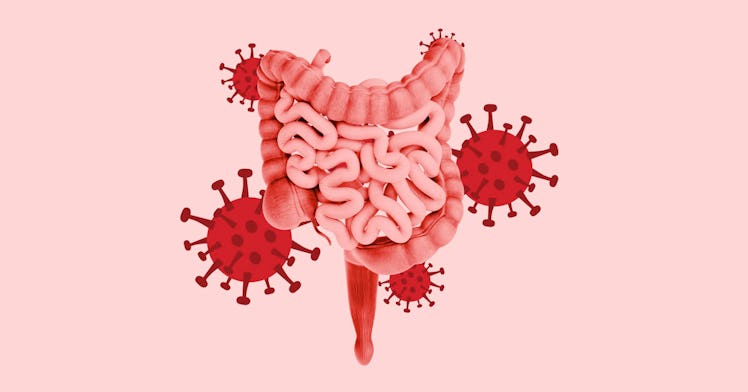Why An Unhealthy Gut Increases Your Risk of Severe COVID-19
Eating fiber keeps your microbiome balanced and gut healthy.

It’s widely known that people with conditions such as
obesity and type 2 diabetes are at higher risk of severe COVID-19. Emerging evidence shows that an unhealthy gut may also increase the risk of severe illness. Specifically, an unbalanced microbiome could lead to a worse prognosis, and changes in the microbiome during illness could lead to long COVID. Luckily, there are ways to improve your gut health and, potentially, the odds of staying healthy if you get COVID-19.The gut contains more than 1,000 species of bacteria, some of which aid in digestion and keep us healthy, and others that are pathogenic and make us ill. Although no two microbiomes look alike, there are certain characteristics that all healthy ones share — and people with severe COVID-19 may not have them, according to a new study.Researchers analyzed blood and stool samples of 100 COVID-19 patients and found that gut microbiota differed in a “continuum” between people with mild, moderate, severe, and critical disease. Compared to pre-pandemic samples, those from people with COVID-19 contain more of some types of bacteria and less of others. “COVID patients lack certain good bacteria known to regulate our immune system,” Siew Ng, a gut microbiota expert at the Chinese University of Hong Kong, told Reuters.The study doesn’t prove whether an unbalanced microbiome, called dysbiosis, leads to more severe COVID-19 or whether it’s a result of infection. However, it did find that people with more severe COVID-19 and a microbiota to match also had more markers of inflammation. Ng’s team suspects that lower levels of “good” bacteria may contribute to how sick a person gets with COVID-19 because of how the gut influences the immune response.Long-lasting changes in the microbiome may explain why some people continue to have symptoms for months after infection. The researchers continued to survey the microbiome of several COVID-19 patients after they cleared the coronavirus from their systems, and their bacteria did not become more balanced. Changes in the gut could be why some people become COVID-19 long-haulers.An unbalanced microbiome may cause a leaky gut, which could cause additional problems with COVID-19, according to a review of recent studies. The lining of the stomach and intestines is supposed to be strong to prevent any leakage of its contents into other parts of the body. But sometimes a variety of factors, including an unbalanced microbiome, can make the lining leaky. In a person with COVID-19, the coronavirus could slip through and reach the bloodstream. From there, the virus could travel to other organs, disrupting their functioning and causing additional symptoms. This theory is not yet proven, but it could help explain why people with altered microbiomes have more severe disease.The good news is that it’s easy to take steps to improve your gut health. To keep your microbiome balanced, eat more fiber. Western diets tend to be low in fiber — one of the main causes of dysbiosis. Probiotics may also help. Ng’s team is currently testing probiotics to alleviate symptoms of people with COVID-19, and early results show that it seems to be working, according to Reuters. Eventually, fecal transplants may even be an option to cultivate a healthy microbiome in people with COVID-19.